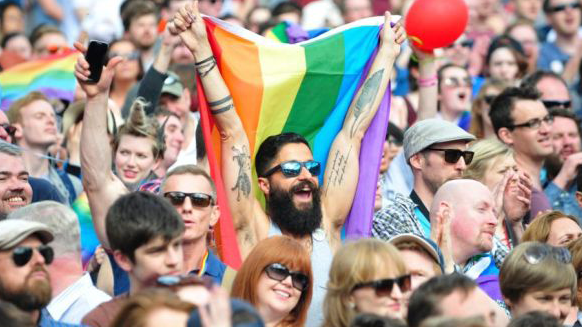Ireland’s People Say “YES”

Now that’s what I call a win. A big win. In what would’ve been a distant dream even a few years ago, the Irish public just voted 62% for marriage equality. For a nationwide election, especially one in which “no” voters had a giant incentive to go to the polls, it’s a spectacular outcome.
I hope you saw some of the photos from the victory rallies, like the one reproduced here. They’re so exuberant, so exultant, and so closely reminiscent of images from times we’ve won in statehouses and courthouses in this country. Pride, tears, disbelief, triumph: joy.
Ireland’s people say “yes”
What makes this outcome so big, of course, goes beyond having another country move over into the marriage-equality column. It’s that it happened by popular vote. In every other one of the 19 countries who’ve made that move, it’s been done by the judiciary or the legislature. Never directly by the country’s citizens. And it’s not clear how many of the other marriage-equality countries would or could have done it by popular vote.
Change in Dublin, change in Rome
This all becomes even more superb when we remember that for centuries Ireland has been deeply conservative, with a rigid sexual morality dictated by the Catholic Church. Much has changed over the past decades, and what was once true actually hasn’t been the case for a while. Ireland has grown closer to the rest of a generally more socially liberal Western Europe and, even more importantly, the Irish Church’s moral authority has been devastated by priest sexual abuse scandals.
And then we’re also looking at an evolving Catholic Church. Pope Francis has been in place just two years, but has clearly signaled – and continues to signal – a shift from obsessive focus on sexual morality to one far more concerned with poverty and injustice. The Vatican announced that the vote was a “defeat,” but given the Pope’s priorities, it seems unlikely that the Church will put that much into the fight.
After May comes June . . .
It hardly needs pointing out that sometime next month – in June – we’ll find out the U.S. Supreme Court’s ruling on marriage equality here at home. Although most members of the Court would deny that foreign events could have any effect on its rulings, the Irish victory can’t help but send a powerful indication of the direction that history is headed. In just a few weeks, we’ll know if the Supreme Court has the United States join this history.


